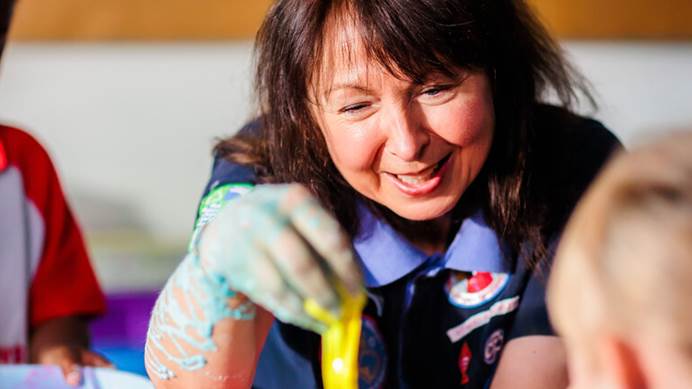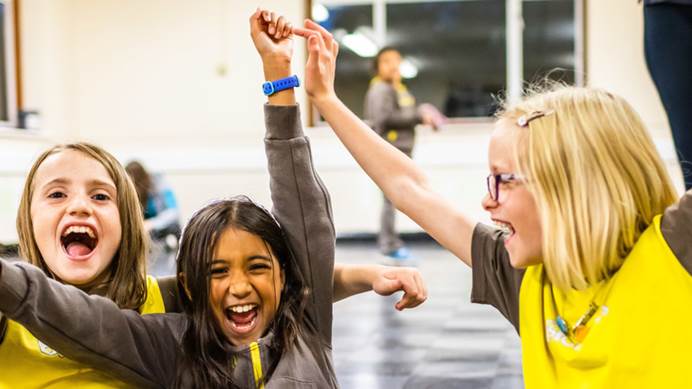Full STEM ahead
We caught up with five women working in STEM at Rolls-Royce to find out what it’s really like to take on an apprenticeship in their field
Our Girls' Attitudes Survey found that nearly half of young women aged 17 to 21 feel there’s a lack of women in Science Technology Engineering and Maths careers (STEM).
We’re working with Rolls-Royce, who sponsor our Innovate skills builder, which shows girls that STEM - science, technology, engineering and maths - is a really fun thing to do!
We caught up with Ella, Neha, Kate and Jemima who are at different stages of apprenticeships at Rolls-Royce and Catherine who is a people and improvement manager at Rolls-Royce, to find out what it’s really like working in STEM.
What do you do at Rolls-Royce?
Ella: I’m a degree engineering apprentice. As degree apprentices, we typically spend 6 months in different placements around the business. This allows us to gain experience in the teams and understand what’s involved in day-to-day work. At the end of the apprenticeship, we aim to find a job in an area of the business where we enjoyed and excelled at the work.
Catherine: I’m a people and improvement manager for some of Rolls-Royce’s new factories. I look after all the people aspects, including people joining teams, looking at the different skills we need in these to develop a great team working environment and place to work.
Why did you decide to go into a STEM career?
Jemima: I’ve always liked problem solving and practical experiments. When I finished 6th form, I had a difficult choice of going to university to study engineering or starting my degree apprenticeship. I think either would have led me to a similar job I have now, but an apprenticeship gives me the best of both of starting my career earlier in one of the best engineering companies at age 19 whilst getting the university experience.
How does what you do make a difference?
Ella: A lot of the work I do at Rolls-Royce is to eliminate waste, benefiting both the company and the environment. My current placement covers areas such as sustainable factories and how to manufacture future products that will contribute to reaching Net Zero.
Kate: Engineering impacts the world around us in many ways, from how we live our daily lives to influencing and shaping the future. Having a career in engineering means I get to explore new possibilities and inventions that can be very disruptive and ground-breaking. It’s a rewarding career to have, not just from a technological perspective. I love that I’m also helping make a difference by inspiring younger generations into a STEM career, especially helping to increase the number of female engineers!
What advice would you give girls and young women to inspire them to pursue a career in STEM?
Catherine: There are loads of STEM careers. So, if you like seeing the results to your work, problem solving, and have an interest in how things work or want to put your skills to use tackling some of the biggest challenges the world has like access to clean, sustainable electricity, then a STEM career could be an option.
You might find that there are more boys in some STEM areas, but don’t let that deter you. To find the best solutions to problems, we need to have diversity of thinking. And the only way we can achieve that is by having teams made up of people with different backgrounds, religions, races, and genders. So, just because you might not see someone like you in a job it doesn’t mean you can’t do it - actually, you will probably help that area be more successful just by bringing your perspective!
Neha: Explore all the roles in STEM, as it’s not limited to engineering and maths, it includes a multitude of different roles such as programmer, web developer, biologist, or a technical writer. There are no limits of what you can do within STEM, and you will always be able to branch out and experience different roles!
Kate: Go for it! Keep trying new things, even if it feels scary. I believe that you grow so much when you challenge yourself and put yourself out your comfort zone. A STEM career is very rewarding and remember that you will get to inspire so many young girls in a predominantly male industry, rather than feeling down that you may be the odd one out!
Did guiding have any impact on what you wanted to do in your future?
Catherine: I joined Girlguiding as a Rainbow, carried onto be a Brownie and then became a Young Leader, rather than a Guide, as my local Brownie group needed more leaders to enable it to continue to run. Girlguiding gave me a group, outside of school, where I could develop my teamworking and then my leadership skills. When I interviewed for university and for my job at Rolls-Royce, I used examples of things I had done with Girlguiding to help me secure the places I wanted.
Kate: I was involved in Girlguiding throughout my childhood. I can see that being part of Girlguiding influenced me to be more adventurous in trying new skills and hobbies. These skills have certainly helped me in my apprenticeship, especially teamwork, leadership, and problem solving.
Do you have any other tips or wisdom you’d like to share?
Catherine: Don’t feel that you must do the traditional route, of GCSEs, then A levels and then university before you start your career. That is a great route and works for lots of people, but it isn’t the best fit for everyone. And there are many apprenticeships out there for all types of careers (not just the stereotype of mechanic type roles), both after your GCSEs and after A levels. These routes might be a better fit for some people, as they allow you to apply the things you learn in a real working environment and have other benefits such as being paid a salary and giving a route to a debt free higher education.
Ella: I’m a huge advocate for apprenticeships. Whilst university life is different to life as an apprentice, the experience I gained whilst on the job is, to me, the most valuable part of my apprenticeship. I can see how knowledge learnt at university applies to the workplace and at the end of my apprenticeship I’ll have 3 years’ experience that most graduate engineers do not.
Visit Rolls-Royce's website to find out more about their apprenticeships programme.



